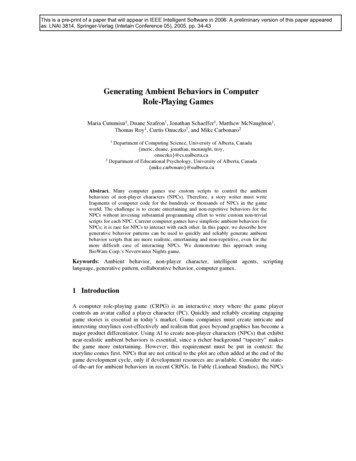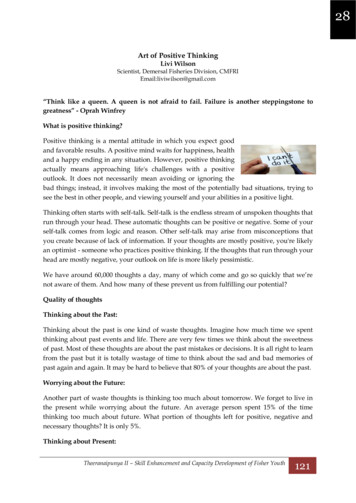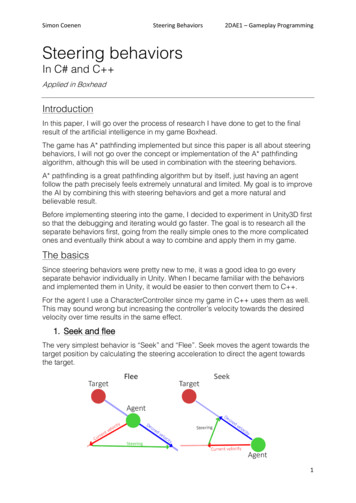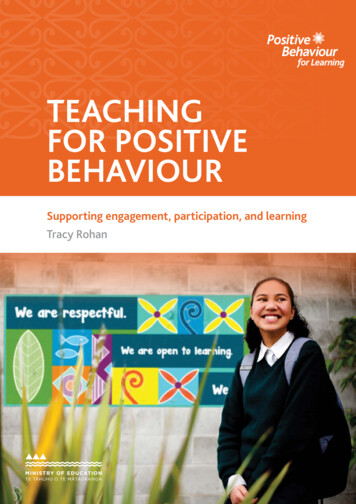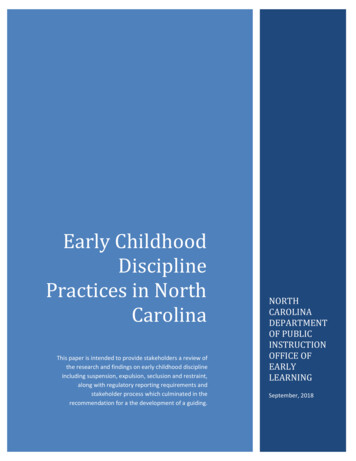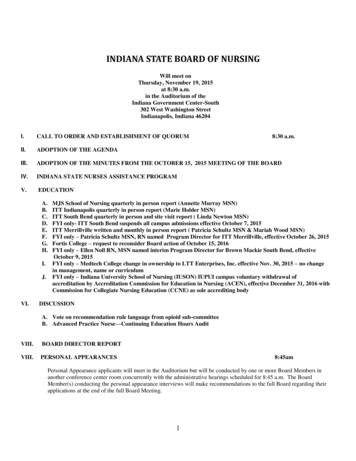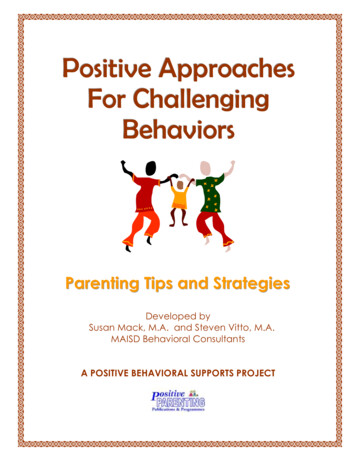
Transcription
Positive ApproachesF or C h a l l e n g i n gB e h a vi or sParenting Tips and StrategiesDeveloped bySusan Mack, M.A. and Steven Vitto, M.A.MAISD Behavioral ConsultantsA POSITIVE BEHAVIORAL SUPPORTS PROJECT
Developed and Compiled by Mack/ Vitto, MAISD 2004
Basic Principles of PositiveBehavior Support“If you know why, you can figure out how .”W. Edward Deming All behaviors meet needs Positive approaches teach children a betterway to meet needs One of the best ways of teaching desiredbehaviors is by modeling them When it comes to children, we need to“walk the talk.”
Developed and Compiled by Mack/ Vitto, MAISD 2004
Table of ContentsPositive Behavioral Support .4Qualities of Strong Families .5Keeping it Simple.610 Keys to Successful Parenting .79 Ways to Make Waiting Fun .99 Things to do Instead of Spanking.108 Ways to Positively Cope.135 Ways to Parent with Finesse.154 Ways to Teach your Child Trust .16General Parenting Tips .17Teaching Self Control .19Teaching Kids to Care for Others.20Doing Chores .21Doing Homework .23Getting Along with Brothers and Sisters .24Respecting Adults .25Controlling Temper and Anger .26Stealing .27Watching TV.28Teaching Responsibility .30Dealing with Tantrums .31Winning the Bedtime Battles .33Developmental Stages .36Reinforcing Good Behavior.37The Language of Encouragement.41When to Say “No” .42Problems with Punishment .43Consequences that Teach.44The Dad Influence.46When Behavior Becomes a Problem .47When Does a Child Need Mental Health Treatment.48More Positive Parenting Helpful Tips .50Where to Turn for Help.52Developed and Compiled by Mack/ Vitto, MAISD 2004
Developed and Compiled by Mack/ Vitto, MAISD 2004
“To discipline is to guide, to lead, to teach, to nurture, to support, to love,to set free ”POSITIVE BEHAVIORAL SUPPORTS Positive Behavioral Supports (PBS) recognizes that all behaviorsmeet needs PBS teaches kids there is another way to approach needs PBS views misbehaviors as an opportunity to teach instead ofpunish PBS recognizes that behavior doesn’t occur in a vacuum PBS believes that there are no “bad” kids, only kids searching fora way to fit in PBS values teaching self-control instead of external control PBS requires us to provide positive, loving environments that areconducive to learning PBS requires us to develop clear expectations and routines PBS requires us to provide effective consequences that teach asopposed to punishing consequences that hurtDeveloped and Compiled by Mack/ Vitto, MAISD 20044
Qualities of Strong Families Commitment Appreciation Time Congruence Purpose Communication Rules, Values and Beliefs Coping Strategies Problem Solving Ability to see the Positive Flexible, Adaptable and BalancedDeveloped and Compiled by Mack/ Vitto, MAISD 20045
The Value of Keeping it SimpleUnityOne meal together, each dayListening to something, togetherPlaying a Game, togetherBedtime storiesFamily reunionsPrayer, Church, CommunityGoing for a Ride, to nowhereTrustSay what we doDo what we sayHelping, holding, honestyTimeThe right to childhoodHarmonyCalm“Do unto others as you would have them do unto you”“I can count on you”Surprise and spontaneityGiving, Sharing, ReceivingShooting baskets. Kick the can, FirefliesAffirmationRecognizing and RememberingPraise and presenceLoveBasic Needs of ChildrenLove, security, acceptance, independence, control, guidance, respectfor others, confidenceDeveloped and Compiled by Mack/ Vitto, MAISD 20046
Ten Keys to Successful ParentingPositive Parenting.comIt is important that we discipline in a way that teaches responsibility bymotivating our children internally, to build their self-esteem and make themfeel loved. If our children are disciplined in this respect, they will not have aneed to turn to gangs, drugs, or sex to feel powerful or belong.The following ten keys will help parents use methods that have been proven toprovide children with a sense of well-being and security.1.Use Genuine Encounter Moments (GEMS) – Your child’s selfesteem is greatly influenced by the quality of time you spend with him, not theamount of time. With busy lives, we are often thinking about the next thing thatwe have to do, instead of putting 100% focused attention on what our child issaying to us. We often pretend to listen or ignore our child’s attempts tocommunicate with us. If we don’t give our child GEMS throughout the day, he willoften start to misbehave. Negative attention in a child’s mind is better than beingignored.It is also important to recognize that feeling are neither right nor wrong. They justare. So when your child says, “Mommy, you never spend time with me,” (eventhough you just played with her) she is expressing what she feels. It is best atthese times to just validate her feelings by saying, “Yeah, I bet it does feel like along time since we spent time together.”2.Use Action, Not Words – Statistics say that we give our children over2000 compliance requests a day! No wonder our children become “parent deaf.”Instead of nagging or yelling, ask yourself, “What action could I take?” Forexample, if you have nagged your child about unrolling his socks when he takesthem off, the only wash socks that are unrolled. Action speaks louder than words.3.Give Children Appropriate Ways to Feel Powerful – If you don’t,they will find inappropriate ways to feel their power. Ways to help them feelpowerful and valuable are to ask their advice, give them choices, and let themhelp you balance your checkbook, cook all or part of a meal, or help you shop. Atwo-year-old can wash plastic dishes, wash vegetables, or put silverware away.Often we do the job for them because we can do it with less hassle, but the resultis that they feel unimportant.4.Use Natural Consequences – Ask yourself what would happen if I didn’tinterfere in this situation? If we interfere when we don’t need to, we rob childrenof the chance to learn from the consequences of their actions. By allowingconsequences to do the talking, we avoid disturbing our relationships by naggingor reminding too much. For example, if your child forgets her lunch, and you don’tbring it to her, you allow her to find a solution on her own and learn theimportance of remembering.Developed and Compiled by Mack/ Vitto, MAISD 20047
5.Use Logical Consequences – Often the consequences are too far in thefuture to practically use a natural consequence. When that is the case, logicalconsequences are effective. A consequence for the child must be logicallyrelated to the behavior in order for it to work. For example, if your child forgets toreturn his video and you ground him for a week, that punishment will only createresentment within your child. However, if you return the video for him and eitherdeduct the amount from his allowance or allow him to work off the money owed,and then your child can see the logic to your discipline.6.WithdrawWithdraw from Conflict – If your child is testing you through a tempertantrum, or being angry or speaking disrespectfully to you. It is best if you leavethe room or tell the child you will be in the nest room if he wants to “Try again.”Do not leave in anger or defeat.7.Separate the Deed from the Doer – Never tell a child that he is bad.That tears at his self-esteem. Help your child recognize that it isn’t that you don’tlike him, but it is his behavior that you are unwilling to tolerate. In order for achild to have healthy self-esteem, he must know that he is loved unconditionallyno matter what he does. Do not motivate your child by withdrawing your lovefrom him. When in doubt, ask yourself, did my discipline build my child’s selfesteem and thereby his character?8.Be Kind and Firm at the Same Time – Suppose you have told yourfive-year-old child that if she isn’t dressed by the time the timer goes off, you willpick her up and take her to the car. She has been told she can get dressed eitherin the car or at school. Make sure that you are loving when you pick her up; yetfirm by picking up as soon as the timer goes off without any more discussion. If indoubt, ask yourself, did I motivate through love or fear?9.Parent with the End in Mind – Most of us parent with the mindset to getthe situation under control as soon as possible. We are looking for the expedientsolution. This often results in children who feel overpowered. But if we parent ina way that keeps in mind how we want our child to be as an adult, we will be morethoughtful n the way we parent. For example, if we spank our child, he will learnto use acts of aggression or intimidation to get what he wants when he grows up.10.Be Consistent, Follow Through – If you have made an agreement thatyour child cannot buy candy when she gets to the store, don to give in to herpleas, tears, demands or pouting. Your child will learn to respect you more if youmean what you say.This document is produced by the International Network for Children and Families and the 350 instructors ofthe “Redirecting Children’s Behavior” course.Developed and Compiled by Mack/ Vitto, MAISD 20048
Nine Ways to Make Waiting Fun Ask your child to make up a silly, outrageous story about whythe waitress is taking so long to deliver the meal, or whatcaused the traffic jam.Hold up an ordinary item such as a pencil or spoon. Have thechild suggest unusual uses for the object.Take turns singing as many songs as you know that have a colorin the song. Example: Rudolf the RED nose reindeer, TheYELLOW Rose of Texas, BLUE Suede shoes, etc.Ask your child to close their eyes and describe what you arewearing.Ask your child to list 10things found in a dentistoffice, car repair shop, orbakery.Thumb wrestle with yourchild.Hum a song and have yourchild guess the title.Give your child the name ofa character in a book. Theyhave to identify the book title.Tell your child three unrelated items such as, a dirty sock,watermelon and a swing set. Ask them to tell you a storyincorporating those items.Developed and Compiled by Mack/ Vitto, MAISD 20049
Nine Things to Do Instead of SpankingBy Kathryn KvolsResearch confirms what many parents instinctively feel when they don’t like to spank theirchild, but don’t know what else to do. The latest research from Dr. Murray Strauss at theFamily Research Laboratory affirms that spanking teaches children to use acts of aggressionand violence to solve their problems. It only teaches and perpetuates more violence, thevery thing our society is so concerned about. This research further show that children whohave been spanked are more prone to low self-esteem, depression and accept lower payingjobs as adults. So, what do you do instead?1.Get Calm – First, if you feel angry and out of control and you want to spank orslap child, leave the situation if you can. Calm down and get quiet. In that quiettime you will often find an alternative or solution to the problem. Sometimesparents lose it because they are under a lot of stress. Dinner is boiling over, thekids are fighting, the phone is ringing and your child drops the can peas and youlose it. If you can’t leave the situation then mentally step back and count to ten.2.Take Time for Yourself –Parents are more prone to usespanking when they haven’t’ hadany time to themselves and theyfeel depleted and hurried. So itis important for parents to takesome time for themselves toexercise, read, take a walk orpray.3.Be Kind but Firm – Anotherfrustrating situation whereparents tend to spank is whenyour child hasn’t listened to yourrepeated requests to behave.Finally, you spank to get yourchild to act appropriately.Another solution in thesesituations is to get down on yourchild’s level, make eye contact,touch him gently and tell him, ina short, kind but firm phrase,what it is you want him to do. For example, “I want you to play quietly.”4.Give Choices – Giving your child a choice is an effective alternative tospanking. If she is playing with her food at the table say, “You can either stopplaying with your food or you can leave the table.” If the child continues to playwith her food, use kind but firm action by helping her down from the table. Thentell her that she can return to the table when she is ready to eat her food withoutplaying in it.Developed and Compiled by Mack/ Vitto, MAISD 200410
5.Use Logical Consequences – Consequences that are logically related to thebehavior help teach children responsibility. For example, your child breaks aneighbor’s window and you spank him. What does he learn from this situation?He may learn not to do that again, but he also learns to hide his mistakes, blamethem on someone else, lie or simply not get caught. He may decide that he isbad or feels anger and revenge toward the parent who spanked him. When youspank a child, he may behave because he is afraid to get hit again, however, doyou want your child to behave because he is afraid of you or because he knowsbetter than to misbehave? Compare this situation with a child who breaks awindow and his parent’s say, “I see you’ve broken the window, what will you do torepair it?” using a firm but kind voice. The child decides to mow the neighbor’slawn and wash his car several times to repay the cost of breaking the window.What does the child learn in this situation? That mistakes are an inevitable partof life and it isn’t so important that he made the mistake but that he takesresponsibility to repair the mistake. The focus is taken off the anger or revengetoward his parent.6.Do Make Ups –Whenchildren breakagreements, parents tendto want to punish them.An alternative is to haveyour child do a make-up.A make-up is somethingthat people do to putthemselves back intointegrity with the personthey broke the agreementwith. For example, severalboys were at a sleepoverat Larry’s home. Hisfather requested that theynot leave the house aftermidnight. The boys broketheir agreement. The father was angry and punished them by telling them theycouldn’t have a sleepover for two months. Larry and his friends became angry,sullen and uncooperative as a result of the punishment. The father realized whathe had done. He apologized for punishing them and told them how betrayed hefelt and discussed the importance of keeping their word. He then asked the boysfor a make-up. They decided to cut the lumber that the father needed to have cutin their backyard. The boys became exited and enthusiastic about he project andlater kept their word on future sleepovers.7.Withdraw from Conflict – Children who sass back at parent may provoke aparent to slap. In this situation, it is best if you withdraw from the situationimmediately. Do not leave the room in anger or defeat. Calmly say, “I’ll be in thenext room when you want to talk more respectfully.Developed and Compiled by Mack/ Vitto, MAISD 200411
8.Use Kind but Firm Action – Instead of smacking an infant’s hand or bottomwhen she touches something she isn’t supposed to, kindly but firmly pick her upand take her to the next room. Offer her a toy or another item to distract her andsay, “You can try again later.” You may have to take her out several times if she ispersistent.9.Inform Children Ahead of Time – A child’s temper tantrum can easily set aparent off. Children frequently throw tantrums when they feel uninformed orpowerless in a situation. Instead of telling your child he has to leave his friend’shouse at a moment’s notice, tell him that you will be leaving in five minutes. Thisallows the child to complete what he was in the process of doing.Aggression is an obvious form of perpetuating violence in society. A more subtleform of this is spanking because it takes it’s toll on a child’s self-esteem,dampening his enthusiasm and causing him to be rebellious and uncooperative.Consider for a moment the vision of a family that knows how to win cooperationand creatively solve their problems without using force or violence. Thealternatives are limitless and the results are calmer parents who feel moresupported.Developed and Compiled by Mack/ Vitto, MAISD 200412
Eight Ways To Positively Cope With DifficultBehavior1.Establish House RulesMake simple rules for your child. Start with a few "things we do and don't do."Discuss them with your child.2. Prevention Is Better Than CureIf you feel that your child's behavior is beginning to get out of control, "nip itin the bud" by distracting your child's attention onto a positive activity or game.3. Understand Your Child's BehaviorDefine simply and clearly any difficult behavior. Keep a diary of what led up tothe behavior and what immediately followed it. From this, see if there is apattern. What are the triggers and consequences which might be keeping thebehavior going? What are the "pay-offs" to your child - are you giving thebehavior a lot of attention and "giving in for a quiet life"? DON'T blameyourself but work at changing your responses.4. Discipline With Short Time-OutsTry to view discipline in a different way e.g. if a rule is broken, discipline with atime out a short, quiet time alone, without play. Alternatively ignore minorbehavior difficulties, as your attention will often inadvertently encourage thevery behavior you want to stop.Developed and Compiled by Mack/ Vitto, MAISD 200413
5. Take FiveWhen tensions and anger rise in you or your child take five. Take five minutesto cool down and to ask yourself, "Why am I getting so angry?" Try to identifythe real problem, and then find the solution.6. Never Strike In AngerResearch has shown that hitting your child does not help, and can do moredamage. Try to avoid striking your child in anger. Smacking is not effective inreducing poor behavior, as it does not teach children good behavior.7. No Yelling AllowedWords hurt, too. Try to avoid yelling at your children in anger. Do not put downyour children. If they break a rule, tell them what they did wrong and why thatmakes you angry. Be angry at what they did, NOT at who they are.8. Get AwayWhen you feel frustrated, angry or overwhelmed let your feelings out safelyaway from your children. Call a friend over or leave your children with someonetrustworthy. Get out. Exercise. Do not stay alone with your children when youare overwhelmed. Get help and support.Developed and Compiled by Mack/ Vitto, MAISD 200414
5 Ways to Parent with Finesseby Deborah Critzer1. React to "shockers" with semi-interested boredom. When children announce something towhich you feel an instant reaction in your gut take a deep breath, smile calmly, and say,"Really? Tell me more." Remember, part of the reason children "come up with" shockingnews is to get you to react or push your buttons. Parents with finesse do not often gettricked into reacting to their children, instead becoming the trickster by showing calmnessand level-headedness.2. Set up a sequence of events that discipline the children and RELAX! The other night mychildren and I were invited to go swimming. Before leaving I explained to them that we wouldbe leaving the pool at 7:30, in my car at 7:40 and home at 7:50. I asked each child, in turn,before we left to repeat this sequence back to me. I then asked what would happen if theabove sequence was not followed (they all correctly responded that we would not be allowedto go back again). I gave them a 15 and 5 minute warning prior to announcing that it was7:30. I then sat back and watched calmly as they began to reluctantly get out of the pool. Myson was still in, looking as if he would not come out. I said to no one in particular, "We have6 minutes to get to the car, I suppose we can make it if we run part of the way I'm not sure,and I'm parked kind of far from here." Everyone began to panic and get dried off, hurrying toget me out of the gate and on the way to the car. At the car I said, "Wow! Great job! Youcould have swam 30 seconds longer!"3. Act as if there is all the time in the world, even when there isn't. Kids know when we are ina rush. A parent with finesse pretends not to be worried and stressed, knowing thatspending 5 calm minutes chatting with a child in the morning can save 30 minutes ofbattling to get out the door on time.4. Notice the little details and acknowledge them. An observant parent recognizes whenchildren contribute. We notice these desirable actions that make our home a better placeand say "Thank you for that!"5. Humility. Parents with finesse know when to say, "I don't know." We know that we do nothave all the answers. We know that we often make mistakes. We apologize when we arewrong. We hold our children accountable for their actions, with compassion, when they haveerred. We know that doing our personal best as a parent means working really hard at itsometimes and giving up and taking a rest other times. We remember often to be grateful,giving thanks for these beautiful little human beings.Developed and Compiled by Mack/ Vitto, MAISD 200415
4 Ways To Teach Your Child Trust1. Be ThereLet your child talk. What was their day like? Ask, "How did that make you feel?"Allow your child to openly express ideas, feelings and worries. Listen. Do notlecture. Be available. Encourage your child to express feelings creatively by keepinga diary or drawing2. Be ConsistentEstablish a reliable routine. A clear and consistent routine helps a child feel safeand secure. Clear-cut rules help a child learn what is right and wrong. Beconsistent!3. Let Your "No" Be NoIf you say "no" to your child, make sure you both understand what that means andkeep to the rule. Then act quickly (seconds), firmly and safely when it is challenged.Carry out any threatened punishment. Do not yell. Your child wants to know thatyour "no" means no.4. No SecretsTell your child it is never good to keep a secret that feels bad or confusing.Developed and Compiled by Mack/ Vitto, MAISD 200416
General Parenting TipsRecognize that all behaviors meet needs. The needs are:oooooooAttentionEscape or Avoid something they don’t likeTo Get SomethingDemonstrate Anger/FrustrationPower and ControlDevelop Status/AcceptanceSensory Understand that children’sneeds are legitimate andteach them an appropriateway to meet those needs. Develop a positiverelationship with yourchildren. Show them everyday that you care aboutthem Clarify rules andexpectations “Model, Model, Model ”When your child is inconflict, arguing, yelling, outof control, etc, model theappropriate way to resolvethe problem Always explain why Being willing to say you’resorry Make the most of the time you are with your kids even if only for a shorttime Understand that they are kids and are still developing. School aged kidslearn by asking questions, practicing, comparing, testing, disagreeing, byexperience, and by modeling.Developed and Compiled by Mack/ Vitto, MAISD 200417
Develop a positive toolbox The more tools parents have, the more effective they will be Many parents already use positive parenting tools, but may need tounlearn negative ones Positive parenting tools offer options for teaching and solvingproblems with our children No single tool works every time, with every child or in everysituation The parenting tools used in the families in which we were raisedinfluence our parenting style Every positive tool a parent uses is a deposit in the emotional bankaccount. A smile, a good word, a gentle hug add to the positiveside of the ledger. Every negative thing parents do to confront,criticize, or punish are withdrawals from that account Demonstrate your values and use the tools to teach those values.Know what you believe in and what you hope to accomplish withyour children and choose discipline techniques accordingly Determine rules and boundaries collaborativelyDeveloped and Compiled by Mack/ Vitto, MAISD 200418
Self Control Teaching self-control is time consuming, but the benefitsstay with your child throughout their lifetime No two parents raise their children the same way. Thecommon element that is shared among parents is the loveof their children Parents will make mistakes along the way, but childrenwho know that they are loved and cared for will develop astronger sense of self External or authoritarian control models force andintimidation and does little to instill self control Teaching self-control to our children models problemsolving, responsibility, and focuses on independence Teaching self-control focuses on developing the strengthsand gifts of each child Teaching self-control also helps build relationshipsDeveloped and Compiled by Mack/ Vitto, MAISD 200419
Teach Kids to Care for Others From a young age have children learn the concept of saving up forsomething Teach kids that they can’t have everything they want Teach kids to judge people by what is on the inside. Kids often learn hate,prejudice, and bullying from their elders Demonstrate the joy of giving to or helping others Teach kids that everything they do doesn’t have a price tag Teach kids that having material things is nice but that there are moreimportant things in life (e.g., helping others, doing what you enjoy, havingrelationships) Be generous with your adult toys. Teach them how to operate the stereo,play pool, cut the grass, wash the car, etc. Your generosity will ultimatelyteach them to be giving and unselfish Teach them to value diversity, and ask questions when they don’tunderstand Teach that professional wrestling or violent shows are just pretend Watch television programs and videos that teach caring Perform acts of kindness and philanthropy Model for them caring for others more than yourselfDeveloped and Compiled by Mack/ Vitto, MAISD 200420
Doing Chores Set clear expectations for family member responsibilities Model responsible work behavior. Work as a family Get in the habit of working first, playing later. Model a strong work ethic Don’t over react to mistakes or do over what the child has done Being responsible for doing chores teaches children many important skills such ascooperation and responsibility Chores also teach children about fairness and commitment. The skills and valueslearned by doing chores will benefit children throughout their lives Children need to know exactly what's expected of them. Therefore, it is a goodidea for parents to make sure their children know exactly what their duties are.Parents should thoroughly go over the duties required, and should actually showtheir children how to do the chore at hand. It might also be a good idea to writedown and post all duties that make up a single chore for children's reference. Atfirst, parents should monitor their children to make sure things are going well.Parents can reduce monitoring once children know how to do the chore Teach one chore at a time Break down the chore into small parts Explain that pitching in and helping are important. Parents should explain thatdoing chores benefits the whole family, and that every person must do his or herpart to keep things going smoothly. Change the nature of chores as children grow. As children grow, they can be givenmore and more challenging chores. Most parents have a good idea of what theirchildren are and are not able to do. Therefore, parents should make sure that thechores they give their children are appropriate to their children's ages andabilities.Developed and Compiled by Mack/ Vitto, MAISD 200421
Set up a reward system or a chart system. If parents have trouble getting theirchildren to do their chores or to do them correctly, a reward/chart system can beset up to encourage cooperation. The general guidelines include making a list ofthe criteria for successful completion of the chore. Then, a chart should be postedin a prominent location in the home. Parents, or children, if they're old enough,should make a mark on the chart for each completed chore. Parents can eitheraward points that can be traded in for a desired reward, or they can simply give adesired reward in exchange for the completion of agreed-upon chores. Finally,parents and children should decide on the reward to be awarded. Instead ofmaterial rewards like candy or toys, it is better if
Positive Parenting.com It is important that we discipline in a way that teaches responsibility by motivating our children internally, to build their self-esteem and make them feel loved. If our children are disciplined in this respect, they will not have a need to
